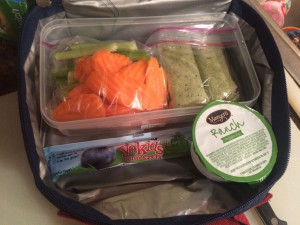by Melanie Taylor | Sep 11, 2015

Packing the kids’ lunches for school means you know which nutritious foods they are eating. Here are some budget-friendly, creative ideas to keep kids happy and healthy at lunchtime.
Make a “Smarter” Sandwich:
While some kids prefer the same thing every day, others may be okay with a slight switch to their sandwich.
- Use different breads like 100% whole wheat tortilla wraps (choose wraps low in saturated and made with no hydrogenated oils) or 100% whole wheat pita pockets.
- Besides lettuce, try shredded carrots or avocado slices with a turkey sandwich.
- Buy blocks of low fat, low-sodium cheeses. You save money when you slice it yourself. Or use a cookie cutter to cut into fun shapes.
- Instead of lunch meat, try a leftover grilled chicken sandwich with lettuce and tomato.
Love Those Leftovers:
Try using the leftovers from the family dinner for the next day’s lunch. Invest in a thermos to keep foods hot or cold until lunchtime.
- Low-sodium tomato, vegetable or bean soups
- Chili made with lean or extra lean ground turkey
- Whole wheat spaghetti with low sodium tomato sauce
- Low-sodium baked beans, bean casserole or beans & rice
Let Them Dunk:
Sometimes it is okay to let your kids play with their food, especially when they are getting extra nutrition.
- Apple and pear slices to dip into low-fat plain yogurt mixed with peanut butter.
- Carrot, celery and sweet pepper strips to dip into hummus, fresh salsa or homemade bean dip.
- Whole grain crackers (choose crackers low in sodium and saturated fat and made without hydrogenated oils) to dunk into low-sodium vegetable or tomato soup.
- Unsalted sunflower seeds, crushed whole wheat cereal and sliced banana to mix into low fat vanilla yogurt (no added sugars) to eat with a spoon like a sundae.
Get Them Involved:
While letting kids in the kitchen might mean a bigger mess, if they help pack their own lunch, they are more likely to eat it! On nights you have a bit more time, like a Sunday night, have them choose which piece of fruit or what type of whole grain bread they want and let them assemble their lunch. Make this a weekly routine – it’s another great way to spend family time together.
For more heart healthy lunch tips visit: www.heart.org
by Melanie Taylor | Aug 15, 2015
 As summer break comes to a close, many children will be experiencing changes in their school experience at an entirely new school. Be sure to make the transition as easy as possible by talking with your child about the positive experiences they may have this new school year. Below are a few tips on how to help you and your child adjust to such a big change with the least amount of stress.
As summer break comes to a close, many children will be experiencing changes in their school experience at an entirely new school. Be sure to make the transition as easy as possible by talking with your child about the positive experiences they may have this new school year. Below are a few tips on how to help you and your child adjust to such a big change with the least amount of stress.
Introduce yourselves to the new school:
• Make sure that the new school expects you: register your child before the first day of class
• If possible, visit your child’s new school: try to meet the office staff, principal, and teachers before the transition to establish a personal connection and to help them prepare for your child’s arrival
• Some schools have “welcome packets” to give to new families; if not, try to get basic information, such as what time the school day begins and ends, the procedure for lunch (can your child buy lunch, does the school provide snacks, etc.), transportation procedures (what’s the bus schedule), and information about health services and emergency procedures
• Try to meet other school families; if you have an elementary school-aged child, see if you can arrange a “play date” with another child in the same grade (preferably before the first day of school.)
• Become involved in your child’s new school. Consider joining the PTA, or volunteering at the school; the more involved you are, the more your child will feel like his or her school is important to you and the more connected he or she will feel.
Help your child adjust:
• Make sure your child understands the reasons for changing schools; if you have an older child, try to give him or her as much “advance notice” as possible so that he or she will have time to adjust to the idea
• If time allows, show your child his or her new school and the surrounding neighborhood; see if you can arrange for a student to show your child around the school and introduce him or her to teachers and staff; some schools have a “buddy system” or other ways of helping your child meet other children in the school
• Make sure the school has what it needs to make the best decisions concerning your child’s classroom placement and academic and social needs; confirm that the new school has obtained your child’s educational, health, and other relevant records
• Be patient. It is perfectly normal for a child to feel anxious, scared, or irritable during times of transition. Let your child know that you understand that this is difficult; take the time to listen to his or her concerns, and spend time together while your child develops new school connections and friendships
• Stick to your routine. If rapid changes have left your child upset, knowing what’s expected at home can provide a comforting calmness. Encourage your child to feel good during this stressful time: encourage (or enforce) a schedule including a regular bedtime and a healthy breakfast.
• If your child had a negative experience at his or her last school, speak positively about the fresh opportunity that the new school presents. Help your child develop new goals for school success
• If your child is young, or is particularly nervous, consider accompanying him or her to school for the first few days
• Encourage your child to become involved in school activities, sports, or after school clubs
• Make sure your child has what he or she needs for the first day of school (ask the school for a classroom supply list.) This will make your child feel more included on the first day.
• Help your child identify something good about his or her new school, and offer comfort and reassurance that adjusting to a new school takes time.
One of the most important steps as a parent is to realize that moving to a new school is a very big deal for many children. There may be a few bumps in the road along the way, but remember to be patient, understanding and there for your child and he or she will eventually adjust. This adjustment could take up to 6 weeks. If the adjustment continues to be struggle after several months be sure to consult with a school counselor to help with any further assistance.
Do you have a skill or passion that you would like to teach the next generation? Consider becoming a 4-H volunteer. 4-H offers a wide variety of opportunities for volunteers to make a difference in their community, or even at their school. Next week, our blog post will focus on ways that you can volunteer through 4-H school programs. To find out more about volunteer opportunities, contact your local UF IFAS Extension Office, or visit http://florida4h.org/volunteers.
by Melanie Taylor | Jul 9, 2014

4-Hers still enjoy swimming and kayaking in the Choctawhatchee Bay. Photo provided by Jackson County 4-H.
Summer is here, and for most 4-H families, that means camp is on the horizon. If this will be your child’s first summer camp experience, you and your child both may have some camp anxieties. But never fear! Here are some simple steps you can take to prepare your camper (and yourself) for camp:
Preparing Campers:
• Plan several sleep overs before the week of camp arrives. Resist the urge to pack their bags for them or to check on them while there. If they have a cell phone, have them leave it at home. This is a good way to practice not having direct or constant contact.
• Encourage them to write a letter to someone (maybe you) while at camp. You will be so excited when you receive a letter from camp! Be sure to include envelopes, addresses, stamps, paper, and a pen in their luggage.
• Gear up physically. If you have purchased new tennis shoes, break them in with a few long walks, so the blisters don’t have to happen at camp.
• Especially for teenagers, have them take a mini-vacation from their electronic devices. A couple of hours or a weekend.
• Have them write a statement for their social media pages. “Peace out Facebook, I will be at camp for the next week. Check in with you when I get back.” Or something similar.
• Have them write down their goals for camp. So they can mentally prepare themselves for what they hope to do and see.
• Make a homesick plan:
1. Homesickness isn’t entirely bad. It’s great to love your home. It’s sometimes part of the process, and it’s a confidence booster when a camper gets through it.
2. Make a happy place plan and write it down. This is an amazing opportunity to learn a life skill. Today’s youth go to technology to escape, and studies show this increases their stress. Some ideas might be: taking 10 deep breaths, traveling to a happy place in your mind, packing a certain stuffed animal, or tossing a football. They are capable of this independence.
3. Your plan should NOT be, “Give it a couple of days and if you don’t like it, we will come get you.” This will set them up to give it a couple of days and knock the confidence right out of them.
4. Let your camper know what to expect with correspondence. You don’t need to write every day, but let them know what to expect.
Parents:
• You are giving your child an incredible gift. I cannot promise you that they will not lose some socks, that they will love every meal or activity, or that they will adore every counselor. But you are preparing them for college and beyond; you are giving them the freedom to gain confidence, independence, and leadership skills; and you are instilling in them that they can do it.
• What do YOU want to do during their time at camp? Plan a vacation for a later time, time to organize, time to have one-on-one time with your other children, or some “date nights” with your spouse or friends.
• If you have apprehensions, work to resolve them. If you are worried that your camper is not going to know anyone, set up a pre-camp get-together. If you are worried about your camper’s medical needs, become friendly with the camp staff. If you are anxious about their food allergies, talk to the camp’s director. Make a camper-sick plan for yourself. Make sure there is only excitement and optimism coming from you, and share your anxiety with another adult.
• Pack self-addressed envelopes in their luggage.
• Whether they are flying or driving, refrain from crying your eyes out until they cannot see you. Take a deep breath, trust, and remind yourself that you are giving them an awesome gift.
And, what is this gift everyone is talking about? At camp, they will be part of a community all their own. They will become emotionally attached to handmade rope bracelets on their wrist, and have a song for any occasion on cue, and maybe even forget they need to shower, and think sunscreen is just a normal daily moisturizing technique. They will learn to do things on their own, and they’ll learn to rely on others. They will learn how to survive on their own for a week or two, and they’ll learn how to help each other through it.
They may even grow up on summers away from TV, and forget Facebook exists. They will relish in the joy of sleeping in cabins, swatting mosquitoes at campfire, and swimming every day. They will savor the feeling of pushing water behind them with a paddle and the whoosh of air behind the tail of an arrow as they fire. They’ll forget about appearances, relish tan lines, and recognize the beauty of a smile over anything else.
So send your kids to camp. Send them so they’ll learn to set tables and make beds and wake early. Send them so they’ll know how to be a leader, paddle a kayak, weave a bracelet, and sing as loud as they can. Send your kids to camp so they’ll learn to love themselves and learn to love others. Send your kids to camp because they’ll realize who they are, or who they want to be. And, prepare yourselves for a year of camp stories, and for a flurry of songs. Prepare to learn names of kids you’ve never met. And for your kids to have a need for sunshine, a need for campfires, and companionship. They will be forever grateful for your awesome gift of summer camp.
Source:
American Camping Association, Inc. (http://www.acacamps.org)


 As summer break comes to a close, many children will be experiencing changes in their school experience at an entirely new school. Be sure to make the transition as easy as possible by talking with your child about the positive experiences they may have this new school year. Below are a few tips on how to help you and your child adjust to such a big change with the least amount of stress.
As summer break comes to a close, many children will be experiencing changes in their school experience at an entirely new school. Be sure to make the transition as easy as possible by talking with your child about the positive experiences they may have this new school year. Below are a few tips on how to help you and your child adjust to such a big change with the least amount of stress.